- Home
- Juliet Marillier
A Dance with Fate Page 19
A Dance with Fate Read online
Page 19
We’re almost there when I remember that the far end of the stables is the place where, when Dau was thirteen years old, Seanan took a knife to his beloved dog while Ruarc held Dau back and made him watch.
19
BROCC
I have lost count of the days since we crossed the lake and moved onto the Long Path. True is tired, and I am growing heartsick. I had hoped for answers sooner. Now I fear my comrade may die before we reach help. Often he walks in silence, as if saving his flagging energy to move his great lumbering body ahead. Perhaps he is trying to spare his tiny folk, for when he is sick or weary or sad, so are they. I wonder what will happen if he dies. Will they, too, perish? And if not, how can I find them a new place of safety? If they could live on a rock face or the bark of a tree or on a riverbank, then he would not have brought them on this journey, surely. Perhaps they are part of True himself, linked in ways I lack the capacity to understand.
The forest through which we travel must lie only within the Otherworld, for I know of no wooded tract so large on any map of Argialla or Ulaid or Dalriada. There is no sign of human habitation here, no high forest edge from which we might see villages or tilled fields or grazing cattle, no chieftain’s fortress, no mill wheel or granary or stable. The only roads are narrow pathways under the trees, as branching and complex as the limbs of an ancient elm. The streams run clear. We fill our waterskins often, for the walking is hard even for me. We forage for food and soon grow hungry.
At night we find shelter and make camp. Where it is safe we make a small fire, as much to give us heart as to keep us warm. At True’s request, I sprinkle water over his little folk, where they nestle in his rapidly drying moss, and the small ones lift up their hands and dance about. These last few days they have become slower to respond to this refreshing bath, and one or two of them do not rise but stay curled up, sleeping on as the droplets fall on them.
“They live still,” True says. “Perhaps tomorrow we will reach help.”
Neither of us knows what form that help may take. A settlement of uncanny folk, maybe, with a healer of particular skill and a cooperative turn of mind. A person like Mistress Juniper but of fey descent. Thinking of Conmael, whom I know to be a nobleman among his clan, I wonder if there are grand establishments to be found, the Otherworld equivalent of the court of Dalriada, with kings and queens, councilors and stewards, and whole teams of physicians and healers ready to help us. Eirne has said almost nothing of other clans within the Otherworld. I do not believe she has ever met fey folk beyond her own small tribe. But if the tales are to be believed, the Tuatha Dé Danann make marriages outside their own clans, they conduct wars and rivalries, they make long journeys, including perilous sea voyages. At least, they did all those things back in the time of the great stories. Are they entirely shrunk to small, isolated groups like Eirne’s, which ended up with a half-human girl as their queen for lack of any other candidate?
We have seen creatures on our way, birds flying overhead or busy in the trees, squirrels scampering and climbing, a cautious badger, a wild pig all tusks and bristles. Not the Crow Folk; not so far. And no folk like Eirne’s people, or indeed like the Tuatha Dé of the tales. If they are here, they are avoiding us. As True and I sit to rest under a monumental oak, I ask him why this may be. I think sometimes I talk only to distract myself from the fact that we have been walking for so long, with True finding it harder each day to keep going, and harder to sit down and get up again, and harder to recall where we are and why we have come here. His tiny passengers sleep much of the time now, and I fear for both them and my companion.
“I remember the day you came into Eirne’s realm,” True says. “You sang, she sang, and in time the portal opened for you.”
“And when my sister came, she, too, used music to find the way.” Liobhan had to wait far longer than I; she sang and played for hours outside the wall before Eirne decided to let her in. “I did think of that, True. But it seems too simple. Besides, we are already in the Otherworld. If I sang a song, we might end up out in the human world. The charm or spell might work in reverse.”
True does not reply. I open the pack, get out the pot of salve, and gently minister to his wounds. My supply of this stuff will not last forever, and I did not ask Moon-Fleet what was in it. Around the injuries, True’s skin is no longer red and swollen. It’s turned an unnatural chalky gray. He does not flinch when I touch the marks of the bird’s claws. I almost wish he was still in pain; I do not like these signs.
“I am the son of a wisewoman,” I mutter, as much to myself as to my comrade. “I should know what to do. I should know how to help. But when my mother spoke of her craft my mind was on tunes and verses, and I did not listen as I should have done.”
“You’ve got your own sort of wisdom,” True says. His tone has become a curious blend of growl and whisper. He’s needing to catch his breath often. “That’ll give you answers, if you let it work for you.”
I’m concerned for him and his tiny folk. I’m fearful for Eirne and the clan back home, with only Rowan to keep them safe from the Crow Folk. For no real reason, I’m uneasy about Liobhan. My mind turns in circles. It will not quiet and let me breathe. Troubles grip me so hard I cannot find the wisdom True sees in me.
“A song,” True says, so quietly I can hardly hear. The small ones’ echo is a wispy squeaking. “Or a tale. A tale of finding what you need, or a song of fixing something broken. That might do it.”
His words open a window in my mind. Through that window I hear splashing water, and I see a wall of stone, many times higher than the one that holds the portal between Eirne’s realm and the human world. There are shapes within that stone, curious forms that I wish I could see more closely. The air of that place is damp; a fine watery spray fills it. Mosses grow thickly on the stones at the cliff’s foot, and tendrils of green climb its face, forming delicate lacy nets. Is that sound a great waterfall? My vision does not show it, only the stones and the green, brightening as somewhere high above the sun emerges from cloud and strikes down to light the watery air to a golden haze.
“You tell a story, True,” I say. “Are there other folk like you? What is their tale?”
“I can’t recall,” my comrade murmurs. “A wall of stone, maybe, and tall folk. As tall as the sky . . . but maybe I was small then. Water falling down, someone carrying me in . . .”
So it was his dream or his memory that came to me a moment ago. A long-ago memory. “I thought I heard that place. Or half saw it. Your home? Before you came to Eirne’s realm?”
“I can’t recall. They are gone, maybe. The tall ones.” After a moment he adds, “Just hum if that’s easier. A song would give us a bit of heart.”
The tiny ones are all lying still; they neither move nor echo True’s words. We must find help today, before nightfall. If True is not close to death, surely they are, and I do not know if he can survive without them. So I sing, another of those songs made up on the spot. When no answers are to be found, a man always has music.
Beside the plunging waters in a deep secluded vale
There dwelled a clan whose folk were named in many an ancient tale
Their bodies sturdy, strong as stone, their hair of mossy hue
The tiny friends that rode on them spoke high and clear and true.
Long years they lived there undisturbed, creatures their only guests
Fish darted in the rocky pool and night owls made their nests
Within the shielding oaks that served as guardians to the clan
Peaceful they were, and wise, in tune with spirits of the land.
There I halt. I know nothing of True’s people. If I invent a tale of, say, the coming of man or indeed of other races of uncanny folk to disturb their idyllic life, how can that ease his mind? I can imagine various dramatic events that might have led to the stone folk being dispersed around Erin or drastically reduced in nu
mber. It’s even possible that True was taken elsewhere as a tiny child, just as I was. He might have grown up among Eirne’s people. How could he remember? I have lived nineteen years; he might have lived nine hundred. I cannot remember the day when the mysterious Conmael first placed me in the arms of Mistress Blackthorn, who was my mother from that moment on. I cannot remember the expression on Master Grim’s face as he first beheld his new son, though I know exactly how it would have been—his plain, strong features would have been alight with joy and wonder. But I have a clear memory of times not so long after that. Playing with Liobhan in the fallen leaves, scrunching them under our feet, throwing acorns at each other. Holding my brother Galen’s hand as I learned to walk. Singing with my sister. Oh, I remember that.
“That place,” murmurs True. “I wonder if it’s still there. That would be the spot. To get a cure.”
My skin tingles. “Now, you mean? Is it possible? Can it be reached from here?”
“In this realm, paths can lead anywhere. They can change as they please, or as the earth pleases. Sing as we walk, Brocc. Sing of those old times and the good folk who lived in them.”
It feels like lies. I cast True’s ancestors as wise and peaceable since, although I have used him as a warrior, he is a being of calm and thoughtful nature. From that, my bard’s imagination conjured a whole race of such folk. But perhaps they were at war; perhaps there were unlawful killings, struggles for power, injustices never put right. Perhaps they were like humankind. That makes me sad. It is not what True needs to hear at this moment.
“A good idea, friend.” My hearty tone sounds a little forced, but True gets up and prepares himself to walk on. He murmurs something to the small ones nestled in his hair, and I think I hear the very faintest squeaking response.
“Tell me as soon as you need to stop and rest,” I say. “I don’t want to press you too hard.”
“Sing well, bard, and we will find the place before nightfall.”
I wish I had his confidence. How good it would be if one could conjure up one’s destination simply by picturing it or thinking hard about it. Or by singing of it. As we set off into the woods once more, I remember something. Didn’t my father once tell me that when my mother needed to talk to Conmael she went off to a quiet place and turned her thoughts on him? Didn’t Father say that Conmael usually did appear, unless he was in some far kingdom fighting evil or performing brave deeds or whatever Otherworld princes do? My mother may be a wisewoman, but she hasn’t so much as a drop of fey blood. Whereas I, though far from wise, am of both human and fey descent. Could I, too, do this? Could I summon a healer, or an elder of True’s clan? Or would that be overreaching myself?
While I ponder this I sing. I give the song about the stony tribe many verses, in which True’s ancestors perform acts of kindness to the creatures of the forest, and nurture the young trees as they grow, and lay to rest the bodies of birds and animals fallen victim to early frost or winter storm or the weary bones of old age. I walk, I drink from my waterskin, I stop to tend to True’s injuries. We pause by a stream and I splash water over the little ones at True’s request. The sun passes across the sky. A rain shower comes, and True stands in it with arms outstretched, while his passengers enjoy a real bath. I see True smile. But he is tired, and there is pain somewhere deep inside his strong body; he says nothing of it, but I see it in his eyes. Dusk approaches and we have not found the place.
“We’d best make camp,” I say, unable to keep the defeat from my voice. “It’s fairly open here. We could have a fire.”
True just stands there.
“There is one more thing I could attempt,” I tell him. “I don’t hold out much hope of success; the only magic I can work, it seems, is through music. But I can try.”
“To take us there?” He sounds so full of hope. My eyes fill with tears.
“To summon help. To summon a friend. Only, when my mother does this, it’s in silence.”
I stand in the middle of the clearing, with pale-trunked birches all around me, their foliage shining in the last daylight. I close my eyes and stretch out my arms with palms upward. I fix my thoughts on Conmael, hoping beyond hope that if he does appear, he’ll feel like helping us. I keep it up for what seems like an eternity. But when I open my eyes, there is only True, watching me gravely.
“You should sing,” he says. “Sing while you’re working the charm. The magic is in your voice and in your hands when you play.”
My treacherous mind fills with ridiculous possibilities to sing, all of them too bawdy or too silly or too inappropriate. That’s what comes of a past existence as a traveling minstrel who must be ready to respond to an audience’s requests, even in a packed drinking hall. I order myself sharply to concentrate. I recall the times when I used my voice to keep off the Crow Folk—the only times, I think, that my singing made magic, save for that one remarkable performance at the court of Breifne, when I did Eirne’s business. I lift my voice in a wordless chant, and as I do so I think of Conmael, because he is real, he is alive, he is my mother’s friend, and if anyone is going to help, he’s a more likely prospect than anyone else I can think of. In my thoughts is an image of Conmael carrying the infant Brocc to Mistress Blackthorn’s door and entrusting him to her care for the next eighteen years. And a far older image from the story my father told me, of how young Blackthorn, who had a different name then, protected and befriended an outcast boy who was tormented and reviled because he was neither one thing nor another. The changeling, the other children had called him, little realizing how close that was to the truth. That kind deed won my mother his lifelong friendship, and at one stage saved her from certain death, though my parents do not talk about that dark time. I think, if it were I who bore wounds and needed healing, where would I want to be? The answer is simple. At home. Not at home in the Otherworld with my wife. At home in Dalriada, at Winterfalls, with my family. This thought is uncomfortable, but I keep on singing.
I hear True murmur, “Good, Brocc.” Birds in the trees join me in the incantation or prayer or charm, their voices sweet and high. I think True’s small people are singing, too, in tones still higher than those avian trills. My eyes are closed, but I feel the moment when things change. The sensation is so odd I have no words for it. I open my eyes.
He’s here. Conmael is here. Tall, pale, solemn, his dark cloak swirling about him, though I feel no breeze. I have seen him a few times before, at a distance, but now I feel like a stranger, and I wonder if I am presuming upon the bond between him and my mother. I feel like some hapless youth who has got into trouble and, instead of solving his own problems, has called up an Otherworld prince to save him. Which is odd, since I am the husband of an Otherworld queen. I should stand tall, greet Conmael with confidence, thank him for appearing. I hesitate a little too long.
“My lord,” says True, and creaks into a bow.
But Conmael has his eyes on me. “I did not anticipate such a summons,” he says quietly. “Are you in need, Brocc, son of Blackthorn?”
He knows me. I bow in my turn. “Greetings, Lord Conmael. I regret—I apologize—” I pull myself together, wishing I had True’s natural dignity. “My friend here urgently needs the services of a healer. He has some injuries that are beyond the ability of anyone in our . . . in our clan to deal with. Eirne—our queen—directed us to take the Long Path. We have walked for many days, but it seems to me something further is required. I would not have called for you, but . . .” I don’t want to put it into words. Not with True listening. But I fear my friend will die. “I sought answers. True told me a little of his ancestral place, and I tried to put it into a song. Later, I sang of healing, of peace, of hope. But it was not enough.”
Conmael has listened with a somewhat bemused expression on his noble countenance. I would like to sing of him one day, but I would not dare. “If it is your friend’s folk that you seek,” he says, “why call on me?”
&nb
sp; “You have always helped my mother. I hoped you might also help me.”
He smiles. It transforms the man completely. “You crossed over into the Otherworld,” he says. “I expected many things of you, but not that. Not so soon. Was it love that drew you so far away from home, Brocc?”
He knows more than I thought. How? Perhaps my mother has told him what happened; I imagine the Swan Island elders sent Liobhan to Winterfalls to break the news that I had turned my back on the human world. But Liobhan did not know all of it. “Love played a part,” I say, thinking that Conmael, too, grew up in the human world. He seems to move easily from one realm to the other. But his home is here, in the Otherworld. Did love play a part for him, too? I cannot ask. “But also a need that I could meet. Eirne’s people have been plagued by the creatures we call the Crow Folk. She and I . . .” I did not plan to tell him this. Why can’t I stop talking? “She and I are at odds as to why they stay in our region wreaking havoc on Fair Folk and humankind alike. But . . . she asked me to help her. To use all the tools at my disposal to keep her people safe. I have many friends among them.” But I miss my human family. Oh, so badly. “True’s injuries were caused by one of the Crow Folk. I think there is poison in those gashes. And the small folk who live on True’s body are also sick. I thought . . . I know that my parents hold you in deepest respect, Lord Conmael. Will you help us?”
A half smile still lingers on his face. I think of the other questions I could ask him, the ones about myself. Who were my parents? Why did they give me up? How was it that Conmael brought me to the human world when I was an infant no more than a few days old and left me there? It was never spelled out that he was not my father, simply assumed. Now is not the time for those questions. Perhaps the time will never come.

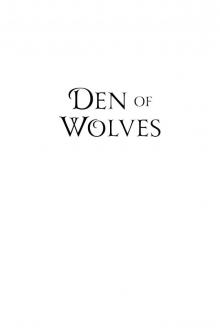 Den of Wolves
Den of Wolves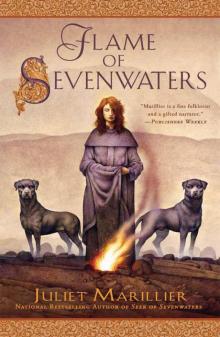 Flame of Sevenwaters
Flame of Sevenwaters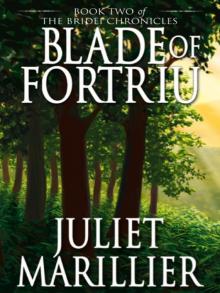 Blade of Fortriu
Blade of Fortriu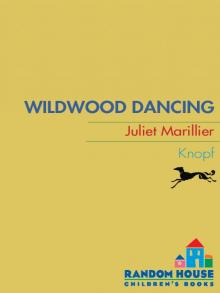 Wildwood Dancing
Wildwood Dancing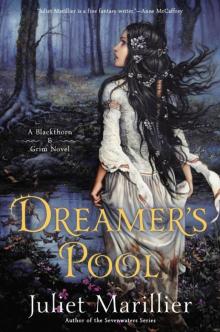 Dreamer's Pool
Dreamer's Pool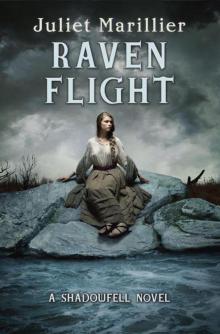 Raven Flight
Raven Flight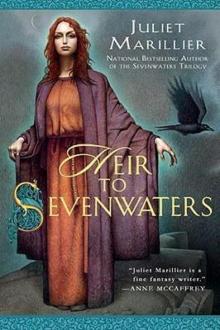 Heir to Sevenwaters
Heir to Sevenwaters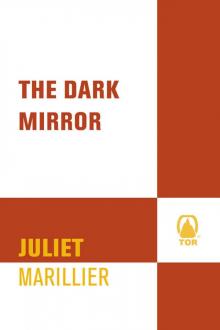 The Dark Mirror
The Dark Mirror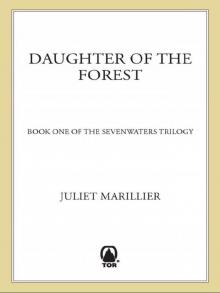 Daughter of the Forest
Daughter of the Forest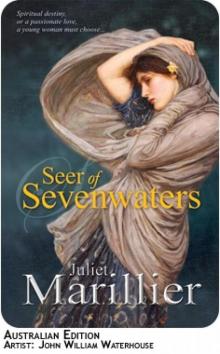 Seer of Sevenwaters
Seer of Sevenwaters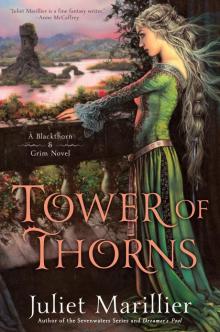 Tower of Thorns
Tower of Thorns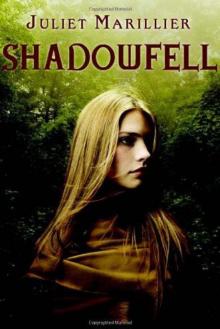 Shadowfell
Shadowfell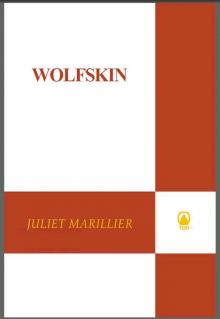 Wolfskin
Wolfskin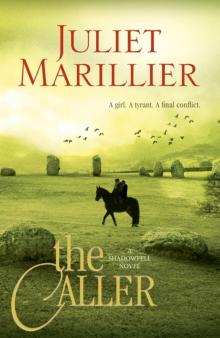 The Caller
The Caller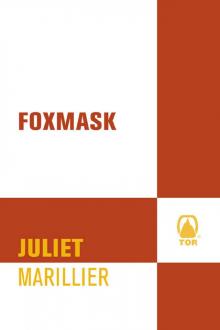 Foxmask
Foxmask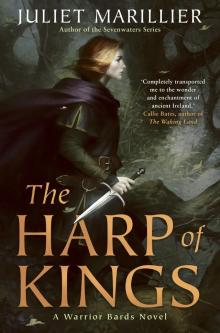 Harp of Kings
Harp of Kings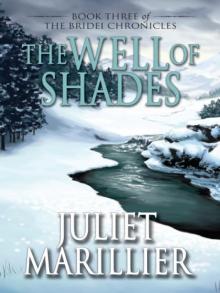 The Well of Shades
The Well of Shades Heart's Blood
Heart's Blood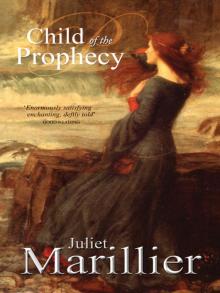 Child of the Prophecy
Child of the Prophecy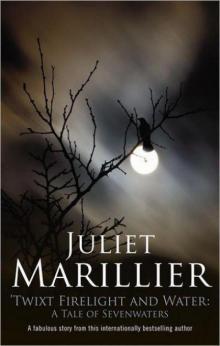 Twixt Firelight and Water
Twixt Firelight and Water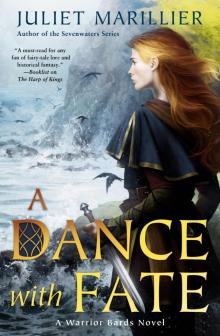 A Dance with Fate
A Dance with Fate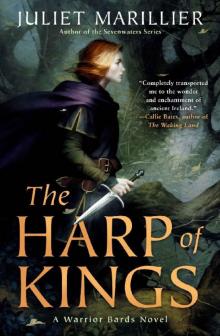 The Harp of Kings (Warrior Bards)
The Harp of Kings (Warrior Bards)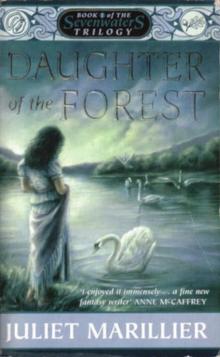 Daughter of the Forest (The Sevenwaters Trilogy)
Daughter of the Forest (The Sevenwaters Trilogy)![Sevenwaters [06] Flame of Sevenwaters Read online](http://i1.bookreadfree.com/i2/04/08/sevenwaters_06_flame_of_sevenwaters_preview.jpg) Sevenwaters [06] Flame of Sevenwaters
Sevenwaters [06] Flame of Sevenwaters![[Sevenwaters 04] Heir to Sevenwaters Read online](http://i1.bookreadfree.com/i2/04/12/sevenwaters_04_heir_to_sevenwaters_preview.jpg) [Sevenwaters 04] Heir to Sevenwaters
[Sevenwaters 04] Heir to Sevenwaters